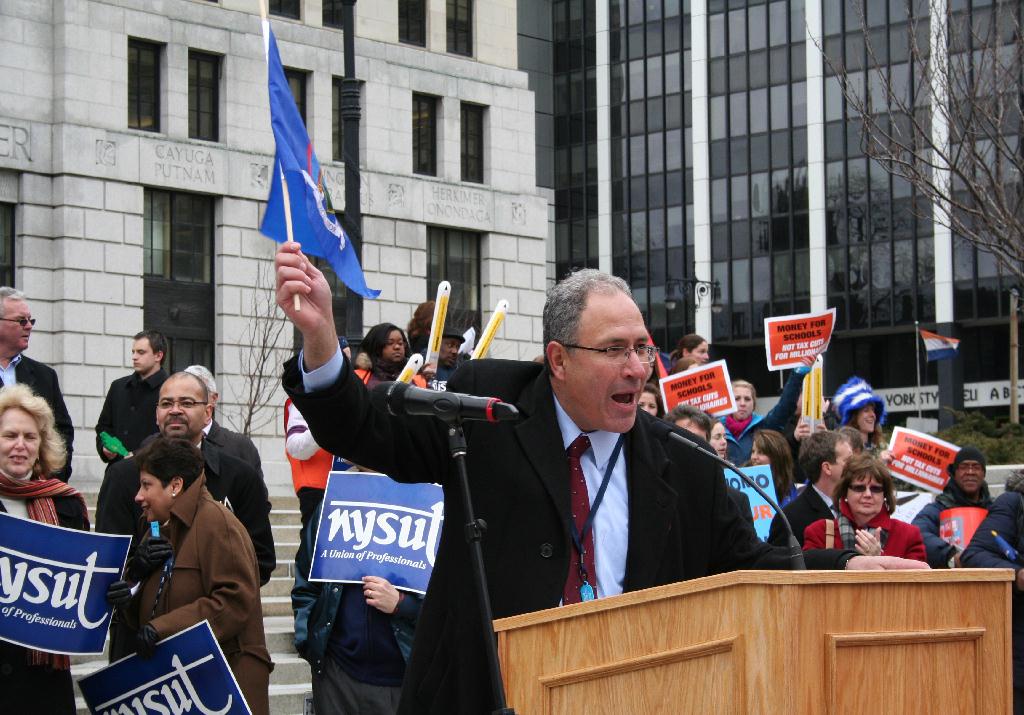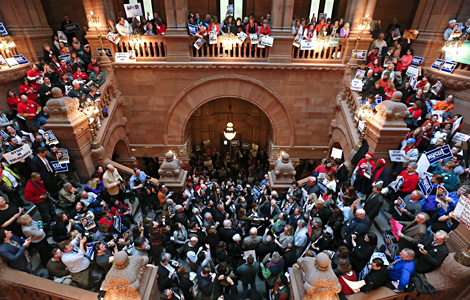
Following Gov. Kathy Hochul’s budget proposal that could create new charter schools in New York City, a poll commissioned by the state’s largest teachers unions indicates there is little public support for the idea.
The poll conducted by Hart Research Associates for the New York State United Teachers and the United Federation of Teachers shows most New York voters do not prioritize the expansion of charter schools as a way to improve education.
On Thursday, February 9, NYSUT and UFT hosted a press briefing in which Geoff Garin, president of Hart Research, was given a chance to speak on the poll findings, and what the public consensus was on the plan to increase budgeting to charter schools.
“We’ve seen immediate and broad pushback to the charter school proposal in the executive budget,” says NYSUT President Andy Pallotta. “Concerned citizens’ groups and lawmakers are rallying to oppose this move. And, as this poll now shows, it’s incredibly unpopular with New York voters.”
In a press release dated Feb. 1, 2023, the Governor’s Office stated that “Governor Hochul will also eliminate the regional cap on the number of charter schools in New York City and authorize the reissuance of charters due to surrender, revocation, termination, or non-renewal. These changes will permit the issuance of additional charters in New York City and expand educational opportunities for students.”
According to the governor’s budget book, approximately 182,000 students attend 343 charter schools in New York state.
While there is no plan to increase the current statewide charter school cap of 460 schools, the Executive Budget would increase New York City charter schools’ per-pupil funding by 4.5 percent and also reissue charters that subsequently closed after July 1, 2015, due to surrender, revocation, termination or non-renewal.
A recent protest outside of the governor’s Manhattan office was organized by groups such as the Alliance for Quality Education, Make the Road New York and New York Communities for Change to voice opposition to the governor’s plan, according to Politico.
“It’s clear that parents and communities really don’t want an expansion of charters. They understand that the resources are being drained from public schools,” said Michael Mulgrew, president of UFT. “This is about corporate charter chains. They’re all about real estate and making profit. We never need that in education. Public schools take all children with open arms. That’s what we do. This is what public education is supposed to be about.”

The teachers unions and Hart Research did not provide the exact questions that were posed to the 801 registered voters who were surveyed between Feb. 3 and Feb. 6, nor did they provide a margin of error. But the unions did provide some key takeaways.
When asked about their top education priorities, 94 percent of voters said they want to see expanded literacy programs for struggling students; 92 percent want more access to career and technical programs that prepare students for jobs, and 88 percent would urge elected leaders to address shortages of teachers, counselors and nurses in public schools.
Just 7 percent of voters listed expanding charters as one of their top two priorities.
By 79-20 percent, voters said “strengthening regular local public schools and making sure that every neighborhood has a good local public school” is more important than “giving parents more choices … by increasing the number of charter schools.” Public school parents oppose charter expansion by a margin of 80-20 percent.
Seventy-nine percent of voters say they oppose plans to increase the number of charter schools in New York and shift funding away from regular local public schools.
Opposition was “overwhelming – and consistent – among region; party affiliation and across racial groups,” according to the teachers unions.
Among the findings, 85 percent of Democrats; 68 percent of Republicans; 77 percent of unaffiliated voters; 77 percent of Black voters; 81 percent of Hispanic voters and 79 percent of New York City voters overall reject expanding charters and siphoning money from their own local neighborhood public schools.
Further pushing the narrative against further funding of charter schools, 68 percent of those surveyed say they do not consider charter schools to be public schools.
“They’re public in the way that they absorb public tax dollars,” said Garin of Hart Research, but he argued that charter schools do not serve the general public at the same capacity that public schools do.









